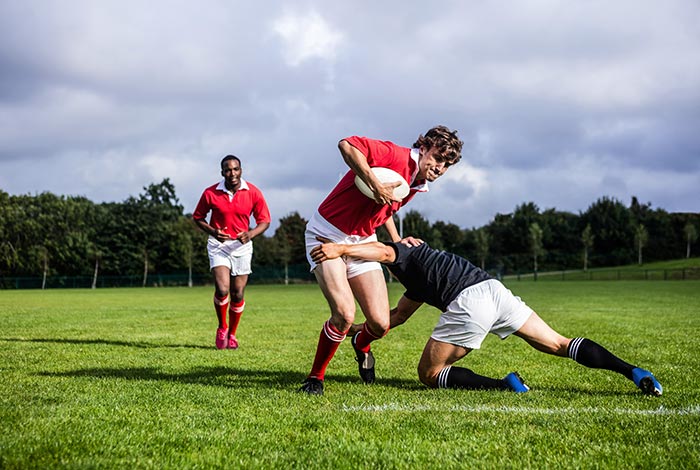We treat many different types of sports-related hip injuries and trauma, which can range from minor sprains and strains to serious fractures or ruptures. If you injure yourself playing sport, it is important to stop immediately as continuing to play with an injury may lead to further and potentially more serious problems. The RICE method (rest, ice, compression, elevation) may help to relieve pain and swelling in the case of minor sprains and strains. More serious injuries need a proper medical diagnosis and may require urgent treatment.
Common Injuries
Among the most common sports-related injuries and trauma to the hips are:
- Hip labral tears – The ring of cartilage around the outside of the hip socket is called the labrum. It holds the ball at the top of the thighbone inside the hip socket and cushions the joint. Certain activities increase your risk of labral tears, including high impact sports like hockey or football, or activities involving making repetitive movements such as running which can cause stress fractures.
- Hip impingement – or femoroacetabular impingement (FAI) – occurs when the femoral head (the ball at the top of the thigh bone) pinches the acetabulum (the cup part of the hip joint), damaging the cartilage (labrum). It can cause pain and stiffness in the hip and increase the likelihood of developing hip arthritis.
- Hip fractures – These can be due to a heavy collision or impact – for example from playing rugby or hockey – or you can be at risk of developing stress fractures if you are involved in activities that involve making repetitive movements.
- Hip sprains and strains – A hip strain occurs when one of the muscles that support the hip is stretched beyond its limit or torn. Hip sprains affect the ligaments around the hip joint. This type of injury can be caused by failing to warm up properly prior to sporting activity or doing too much too soon.
Causes of hip sports injuries and trauma
- Hip labral tears are associated with injuries to the hip joint or hip dislocations. This can be as the result of heavy collisions or making repetitive motions that cause wear in the hip joint. Certain types of structural problems in the hip increase the risk of labral tears.
- Hip impingement may occur as the result of a deformity of the femoral head or the acetabulum or a combination of both, resulting in friction as the ball moves inside the hip socket. Sometimes people are born with hip deformity or it can develop as the result of making repeated squatting or hip twisting movements, for example in certain sports. Some conditions like slipped capital femoral epiphysis can also cause abnormalities.
- Hip fractures, sprains and strains are common sporting injuries and may range from stress fractures and minor sprains through to compound fractures or ruptures. They may be due to a traumatic injury or repetitive strain, causing damage to bones or soft tissues.
Symptoms of hip sports injuries and trauma
- Hip labral tears cause pain in the hip or groin which may be worse after long periods of standing, sitting or activity. Your hip may feel stiff and there may be a clicking or locking sensation when you move.
- Hip impingement symptoms include pain or stiffness in the front of the thigh or groin. Bending the hip or bending down from the waist, or extended periods of sitting, may exacerbate these symptoms.
- Hip fractures, sprains and strains vary in severity from minor pain and swelling to being unable to use the affected limb. A hip strain or sprain is characterised by pain, stiffness, swelling and tenderness around the hip. Any kind of movement will intensify the pain and you may find it difficult to walk.
Diagnosis of hip sports injuries and trauma
Diagnosis will involve a physical examination and you may also need diagnostic imaging (X-ray, CT scan or MRI scan) to confirm the diagnosis and/or assess the damage.
Treatment of hip sports injuries and trauma
Treatment will depend on the type and severity of the injury. If you have a hip labral tear, for example, you may make a complete recovery with rest and painkillers or an injection of corticosteroids into the joint. However, in some cases you might need surgery to repair the tear. Whatever type of injury you sustain, your orthopaedic surgeon will assess the damage and discuss the treatment options with you.
Outcomes of treatment for hip sports injuries and trauma
The outcome of treatment will depend on a range of factors including the type of injury or trauma, the treatment you receive, your age and general state of fitness and health.
OUR CONSULTANTS
We are an experienced and highly qualified team of orthopaedic surgeons using the latest surgical and non-surgical techniques to eliminate or reduce pain so our patients can experience the best possible quality of life.
BOOK A CONSULTATION
Whether you have an existing diagnosis or you are keen to discover what is causing your symptoms, contact us to arrange a consultation. We can organise any tests you require and discuss your treatment options.
What Our Patients Say

